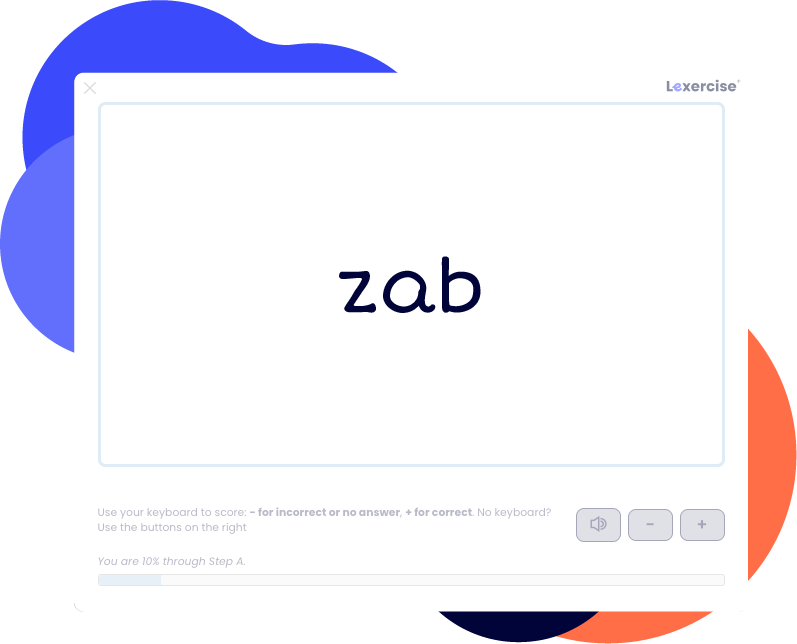How To Diagnose Dyslexia
Written by Elizabeth McGaughran
Published on February 27, 2023
If you’re worried about your child’s reading, writing, or spelling abilities, diagnosing dyslexia involves two key steps. First, begin with a dyslexia screener, which helps determine if your child is at risk for dyslexia. This initial assessment is a crucial tool for early identification. Next, if the screener suggests a risk, a comprehensive evaluation by a specialist is recommended for a definitive diagnosis. Lexercise’s free dyslexia screener, endorsed by the National Center for Improving Literacy for its validity, is an excellent starting point to assess potential dyslexia risk.
But dyslexia screening is only the first step.

How is Dyslexia Diagnosed? Dyslexia Screeners versus Dyslexia Evaluations
While screening is designed to be a brief, inexpensive, and reliable way to identify students who are likely to have a reading disorder, a formal evaluation is designed to diagnose the type of reading disorder.
Unlike a screener, a formal, dyslexia evaluation includes an extensive battery of tests, including tests of listening comprehension as well as tests of speech sound processing, and tests of reading and spelling. According to the science of reading and the Simple View of Reading, a dyslexia diagnosis is typically made when listening comprehension skills are stronger than word reading and spelling skills.
According to the International Dyslexia Association,
“Assessment of dyslexia involves individual testing, most often provided by a team of qualified professionals who have had extensive clinical training in assessment as part of a graduate degree program. Professional clinicians who assess Specific Learning Disabilities (SLD) and dyslexia may have M.A., M.S., M.ED., Ed.D., or Ph.D. degrees in Education, Reading, Speech Language Pathology, School Psychology, Psychology, or Neuropsychology. Evaluation by a medical doctor is not required for assessment or identification of SLD or dyslexia.”
Lexercise evaluators are qualified Lexercise structured literacy therapists who have additional professional preparation and experience in administering and interpreting assessments of reading, spelling, and writing and in the use of the Lexercise evaluation protocol and software.
Connect with a Dyslexia Teletherapist for a Free Consultation
What is Included in a Dyslexia Evaluation?
A professional dyslexia evaluation should include the following:
- Background Information
- Listening & Speaking (including vocabulary, listening comprehension, oral language fluency, etc.)
- Single Word Recognition
- Decoding
- Spelling
- Writing
- Phonological Processing
- Oral Reading Fluency
- Reading Comprehension

A dyslexia evaluation report should include an analysis of the assessment data along with a summary of findings. It should also provide recommendations for research-backed intervention and school accommodations.
The Lexercise Language Processing Evaluation is administered virtually during a video-conference session so you don’t have to leave your home. The evaluation procedures are consistent with best practices for online services, such as teletherapy. The evaluation takes approximately 90 minutes to complete, but a two-hour session is scheduled so that there is plenty of time for brain breaks. Both the guardian and the student need to be present in a quiet, distraction-free space. About one to two weeks following the evaluation, we will schedule a 30-minute consultation to review the evaluation report and answer any questions you may have.*
How to Help Your Child After a Dyslexia Diagnosis
If you suspect your child has dyslexia or another learning disability, you can start by taking one of our free learning disability tests. If you are seeking a Professional Dyslexia Evaluation you can learn more and schedule an appointment with us. The great news is that you do not need to wait for a full diagnosis to begin dyslexia therapy. You can connect with one of our expert therapists or schedule a 15-minute consultation and start structured literacy therapy today. Facing a dyslexia diagnosis can be challenging, and we’re here to help.
A Note on Public Schools and Evaluations for Accommodations
*Public schools typically require additional assessment by their own staff before they will consider a child for Exceptional Children’s Services. However, public school policies usually state that the school must “consider” evaluation results from any credentialed professional in qualifying a child for Exceptional Children’s Services. Further, under the Americans With Disabilities Act, they must provide **accommodations** (i.e., a 504 Plan) to a student with a disability diagnosed by a qualified professional. There is a sample evaluation report you can download and study on our website. We highly recommend that you show the sample evaluation to your child’s school and get their confirmation that they would accept it for an IEP if a diagnosis were to be made during the evaluation.
Improve Your Child’s Reading
Learn more about Lexercise today.
Schedule a FREE
15-minute consultation


